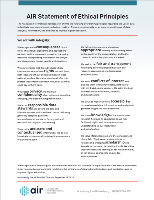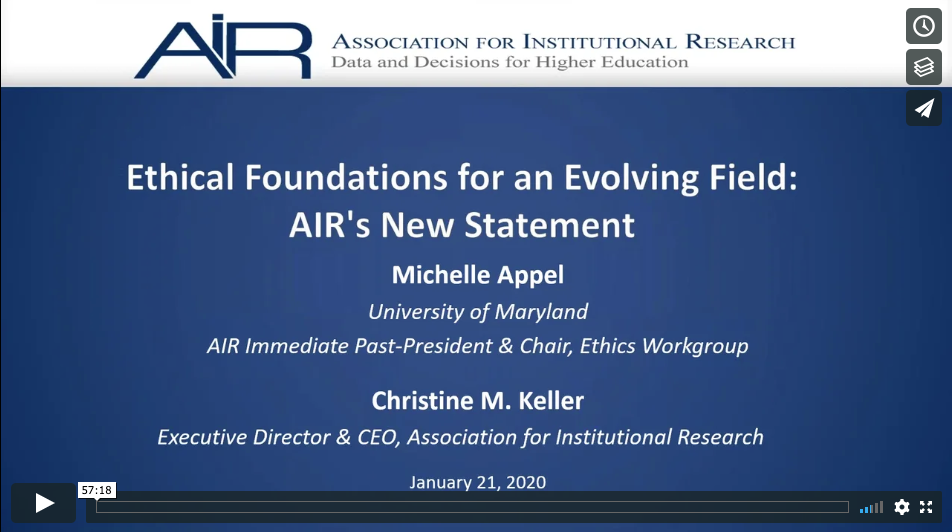Data use for decision-making in higher education is critical for improving student success and institutional effectiveness. Those improvements are valuable only when achieved through integrity, professionalism, and fairness.
In September 2019, the Association for Institutional Research (AIR) Board of Directors approved the AIR Statement of Ethical Principles to modernize the principles guiding our professional community.
Webinar: Ethical Foundations for an Evolving Field
How do we navigate the ethical landscape of an ever-evolving field? This January 2020 webinar introduces the AIR Statement of Ethical Principles, which serves as a foundation for our work and is poised to adapt to constantly emerging trends.
Related Articles
-

Data Ethics Haiku
As data stewards, we are responsible for ensuring the privacy and security of information we use and share. The AIR Statement of Ethical Principles outlines the integrity of our profession. An important area of our ...Read Moreabout: Data Ethics Haiku -

Campus Leaders Reflect on IR, Ethics
A consistent theme in the reactions to the AIR Statement of Ethical Principles has been concern over the tension between what campus leaders want and what IR/IE practitioners see as the correct or ethical path. We ...Read Moreabout: Campus Leaders Reflect on IR, Ethics -
Ethical Use of Data: Scenarios for Discussion
The full impact of the COVID-19 pandemic on our students, prospective students, faculty, and staff is not yet known. Institutional research professionals can help support a better understanding of this impact by first r...Read Moreabout: Ethical Use of Data: Scenarios for Discussion
Ethics in Action
The AIR Statement of Ethical Principles is an eloquent expression of integrity, professionalism, and fairness to guide the use of data in decision-making within higher education. Yet crafting a statement isn’t enough in and of itself; to
fully appreciate and employ the principles, we must understand how they can be employed. Contextualizing the principles through examples helps make them tangible and relatable so that they remain germane to the work we do.
To that end,
AIR is gathering scenarios from the data community that feature examples of how the ethical principles are called upon in our work. Those submissions are featured below, and the collection will grow as new material is shared with AIR. The content
is anonymous, and the information presented is intended to provide material for personal reflection and frame conversations with colleagues who engage with our work, including collaborators, clients, consumers, and stakeholders. Learn more here.
The AIR Statement of Ethical Principles does not serve as or substitute legal advice, and the scenarios are not detailed roadmaps for resolving challenges. Rather, this content is intended to build awareness of the ethical implications of data production and use in higher education and provide tangible examples to frame discussion. If you have serious ethical concerns, please contact your institution’s or organization’s legal counsel.
The Evolution of AIR’s Ethical Principles
As the higher education landscape has evolved over the years, so too have our ethical guidelines to remain relevant and useful.
- January 2020: The AIR Statement of Ethical Principles was published.
- September 2019: Feedback and suggestions were incorporated into the final draft for comment, and the principles were approved by the AIR Board of Directors.
- May 2019: After a year of collaboration, the AIR Board of Directors presented a draft of the principles at the 2019 AIR Forum in Denver, followed by a broadly-communicated open comment period.
- 2018: The Board embarked on an examination of the current Code of Ethics and Professional Practice (Code). Of particular interest was how the Code addressed the emerging topics of data analytics, big data, and vendor relationships. It became clear that both ethics and best practices had been blended into a single document.
- May 2013: The Code was amended, and the title was updated based on committee recommendation.
- December 2001: The Code was updated.
- December 1992: The Code was adopted by the membership. It was developed to provide members of the association with some broad ethical statements with which to guide their professional lives and to identify relevant considerations when ethical uncertainties arise.
"I am genuinely proud to be part of an organization that puts such a significant emphasis on ethical principles and behavior. The AIR Statement of Ethical Principles not only provides IR professionals with guidance regarding the ethical use of data and information, it also informs our leadership and our colleagues of the values and behaviors they can and should expect from us."
Julie Carpenter-Hubin
Assistant Vice President for Institutional Research and Planning at Ohio State University (Retired)
"Colleges and universities should use the AIR Statement of Ethical Principles to develop policies and practices that govern our use of data, analytics, information, and evidence in support of institutional effectiveness. These principles undergird professional practice and are critical to sustaining public trust in what we do. More important, the statement provides an assurance to our students and their families, our faculty and staff, and our communities that we are committed to acting with integrity."
Archie P. Cubarrubia
Former Vice Provost for Institutional Effectiveness at Miami Dade College
"I applaud the Association for Institutional Research for putting forward these principles to guide professionals through the ethical challenges that can emerge in the analysis, presentation, and use of data. This type of guidance is important to the field and will help ensure that, as available data continues to expand, they will be used for the benefit of students and the improvement of higher education. "
Iris Palmer
Senior Advisor for Higher Education and Workforce, Education Policy Program at New America


